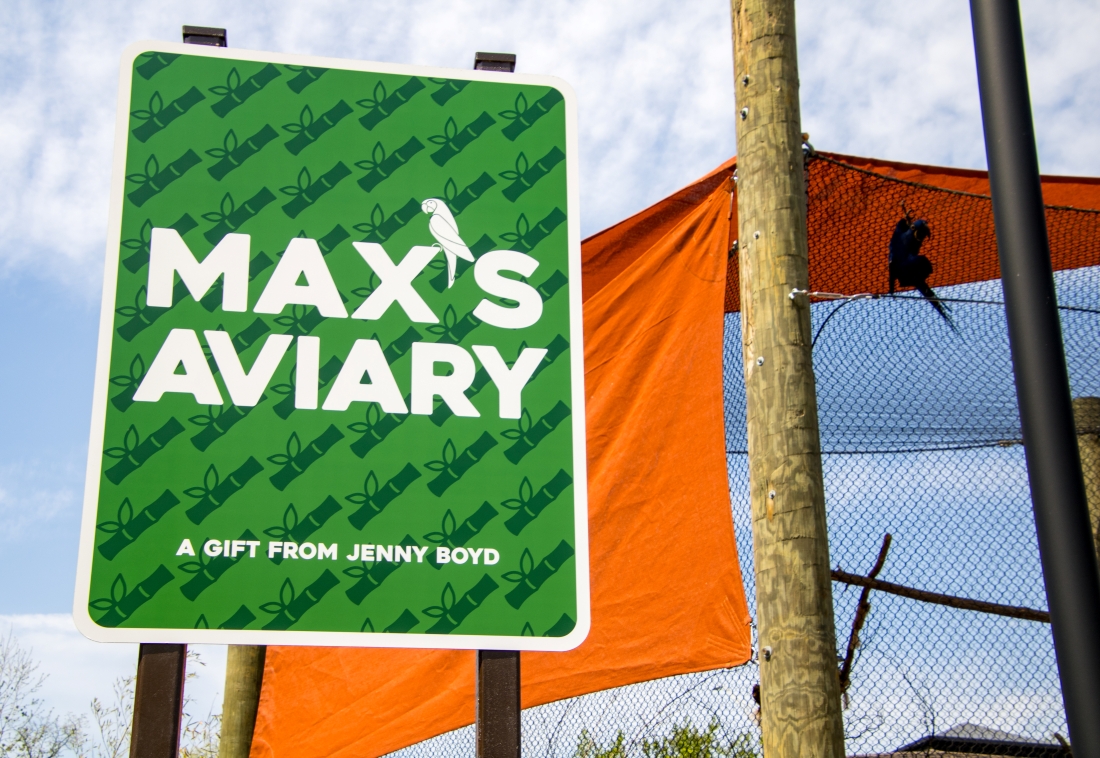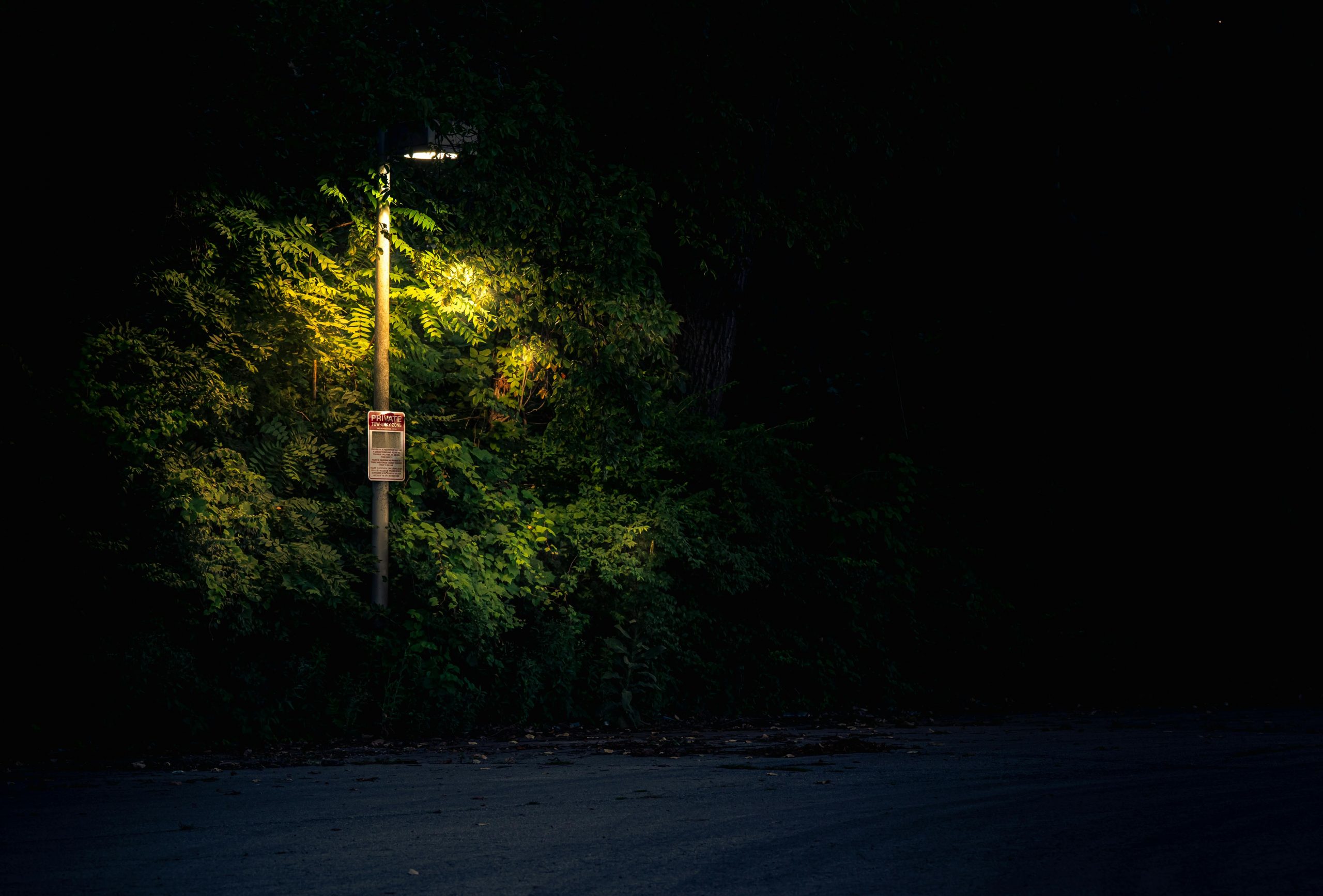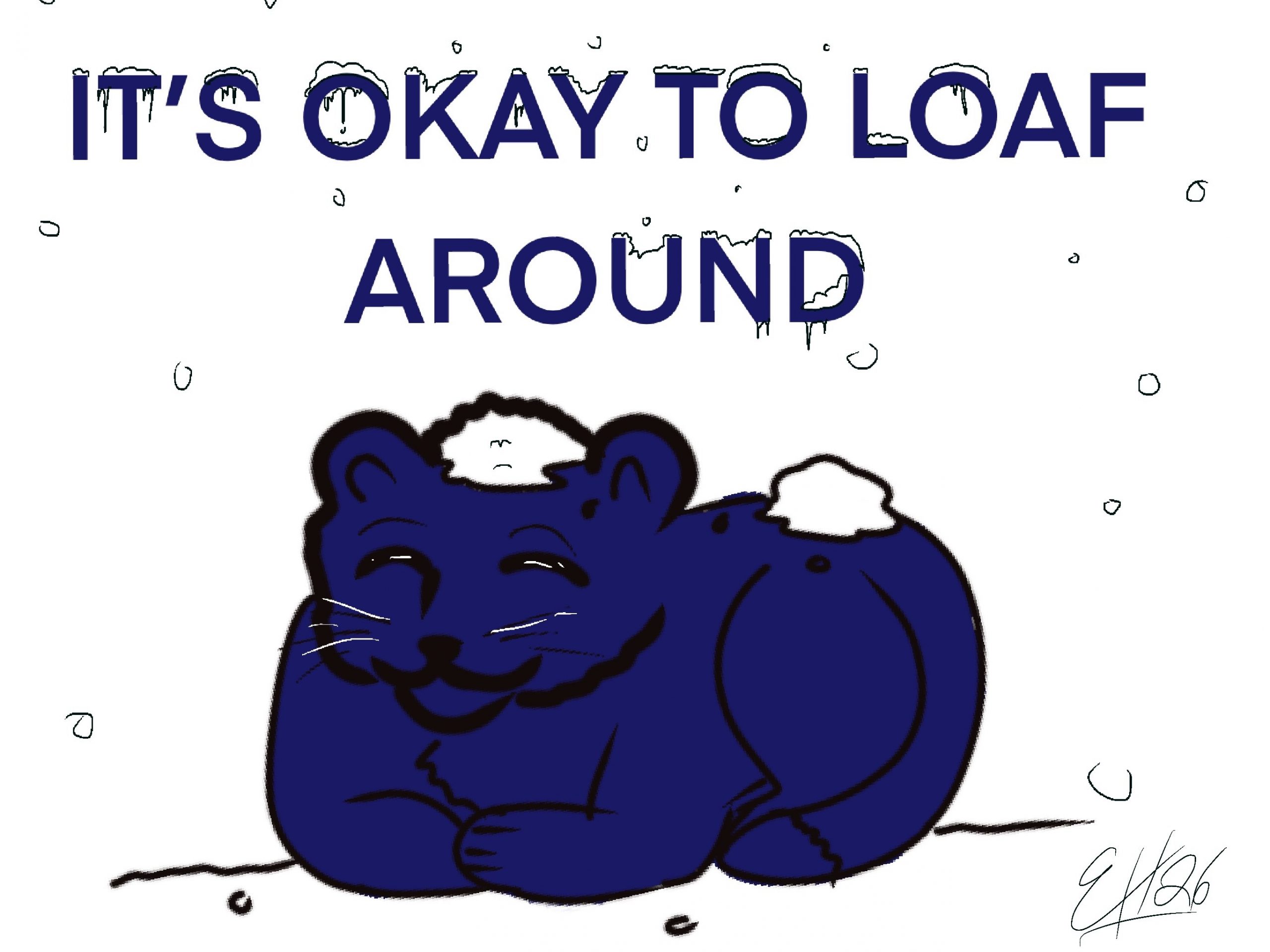By Charlie Dobyns, Science Writer
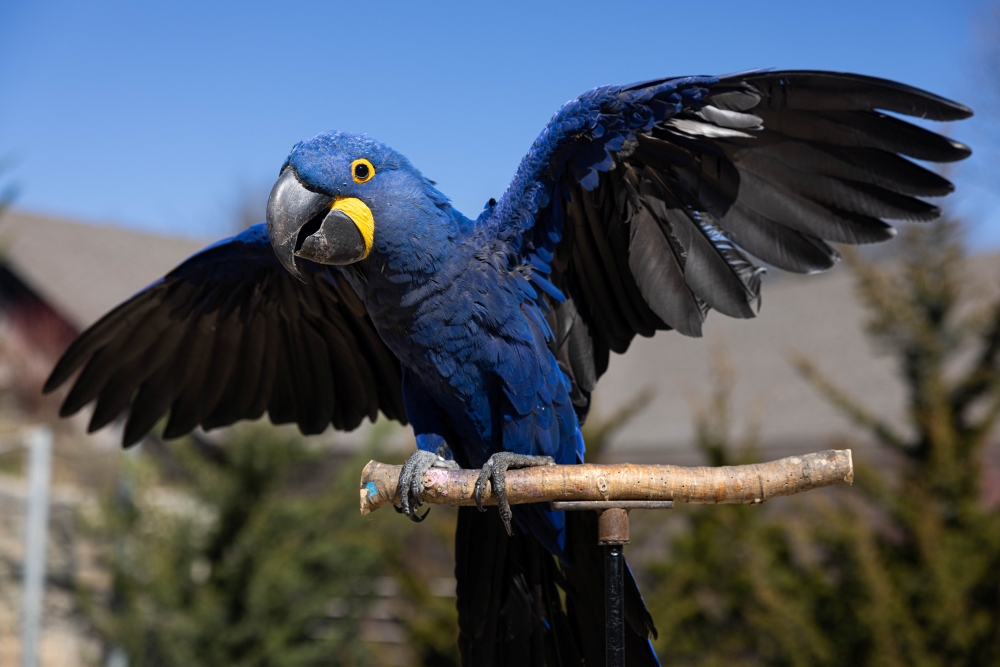
Walking into Zoo Knoxville, you are bombarded by noise. Children are excitedly shouting, the animals by the entrance are vocalizing, but cutting through the noise are the calls of the macaws. The macaws have a distinctive scream, luring visitors to come closer and see what animal could possibly be so loud. As visitors approach Max’s Aviary, they’ll see that the only thing more striking than the calls of the macaws are the birds themselves.
Max’s Aviary, which opened March 15 of this year, was donated by the Boyd family and named after the family’s late parrot, Max. It’s now home to almost all of the birds in the zoo, including the world-famous African Grey, Einstein. On display to the public are the four species of Macaw that call the zoo home.
Spencer, a striking hyacinth macaw, positions himself front and center, as if his cobalt plumage didn’t demand enough attention; he is easily the largest and loudest of the four birds. Tango, not to be outdone, is a critically endangered blue-throated macaw, with a blue head and back and a vibrant yellow chest. He can be found doing pull ups with his beak to show visitors just how strong he is.
Hanging out in the back of the exhibit are Opie and Hercules, a pair-bonded couple. These two birds need to be together or they become stressed; as long as they’re together, they’re happy. Opie is a scarlet macaw with crimson plumage leading into yellow and blue flight feathers, though, at the time of our visit, he had gone through a plucking spell and his feather regrowth was in the gray and fuzzy stage. Hercules is a very reserved and stunning blue-and-gold macaw, who greatly prefers the company of his mate, Opie, to the spotlight.
The new aviary highlights the importance of conservation for these animals as well as discusses the dangers that the species are facing. Charlotte, the lead keeper for the aviary, discussed with us the primary threats as well as what we can do to help macaw conservation efforts.
One of the largest threats these birds face is deforestation. As natives of South and Central America, the clear cutting of the Amazon and other forests is putting the habitats and food sources of macaws at risk. Ethical consumerism is the best way that individuals can help combat deforestation in South and Central America, by making sure you buy products that aren’t contributing to further deforestation.
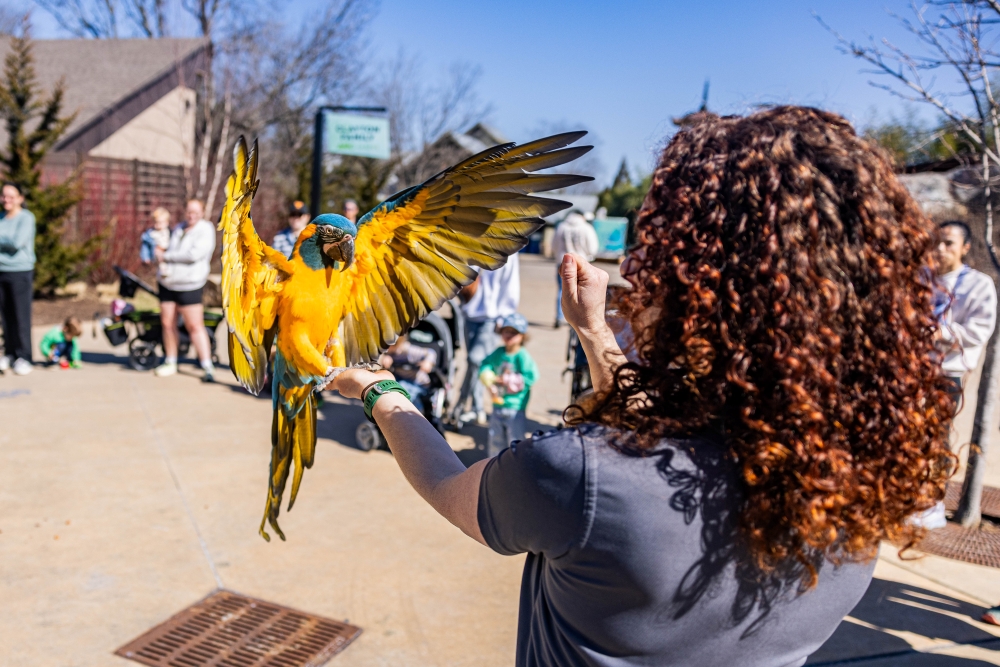
Charlotte also discussed the coffee industry with us, describing how the massive swaths of land cleared for coffee cultivation are detrimental to the macaws. She told us about shade grown coffee, where the beans are allowed to grow naturally in shade; the compromise being that shade grown coffee takes longer to mature so, in her words, it is “slightly less profitable, but it’s ethical and it helps support the rainforest and gives homes for the birds.” For those interested in supporting the shade-grown coffee movement, look for labels that say “bird-friendly.”
Charlotte talked further about how favorable consumerism can further help the macaws:
“A lot of times when people visit South American countries they’ll have places that want to hand you a bird and offer you photo opportunities, and you don’t really know what’s ethical, how that bird was obtained, how it’s okay with being put on random people,” Charlotte explained. “So just make sure you’re doing your research and supporting ethical tourism.”
Later on in our conversation, we spoke about volunteer opportunities to help macaw conservation, and how they can be seen as an ethical alternative to tourist centered bird photo-ops. She told us about the Ara Project, an organization devoted to restoring parrot populations in the Caribbean and Costa Rica, and about the potential to volunteer and help with animal care, feeding, and surveys.
Throughout our visit, the primary focus of discussion was the effect that the pet trade has on these birds. Due to their spectacular plumage and high level of intelligence, many people see macaws as a desirable pet. This could not be further from the truth.
The intelligence level of these birds is comparable to that of a seven year old. So, while having an intelligent pet may sound like fun, it requires far more work than is reasonable for most pet owners. Macaws are accustomed to constant mental stimulation, and can throw temper tantrums if not given adequate stimulation. A parrot temper tantrum might seem silly, but, with beaks designed to crack brazil nuts, they have the same bite strength as a tiger, meaning that those in the wake of an upset parrot can be in legitimate danger.
During our visit we watched Charlotte give a talk to guests about the birds as individuals and as representatives of their species; during her talk, however, Spencer and Tango were competing for her attention. Their initial method was seeing who could scream the loudest. This sound was ear-splitting in an outdoor environment, displaying how obviously unsuited for domesticity these birds truly are. When screaming didn’t work, Tango resorted to biting Spencer in an attempt to dissuade his competition.
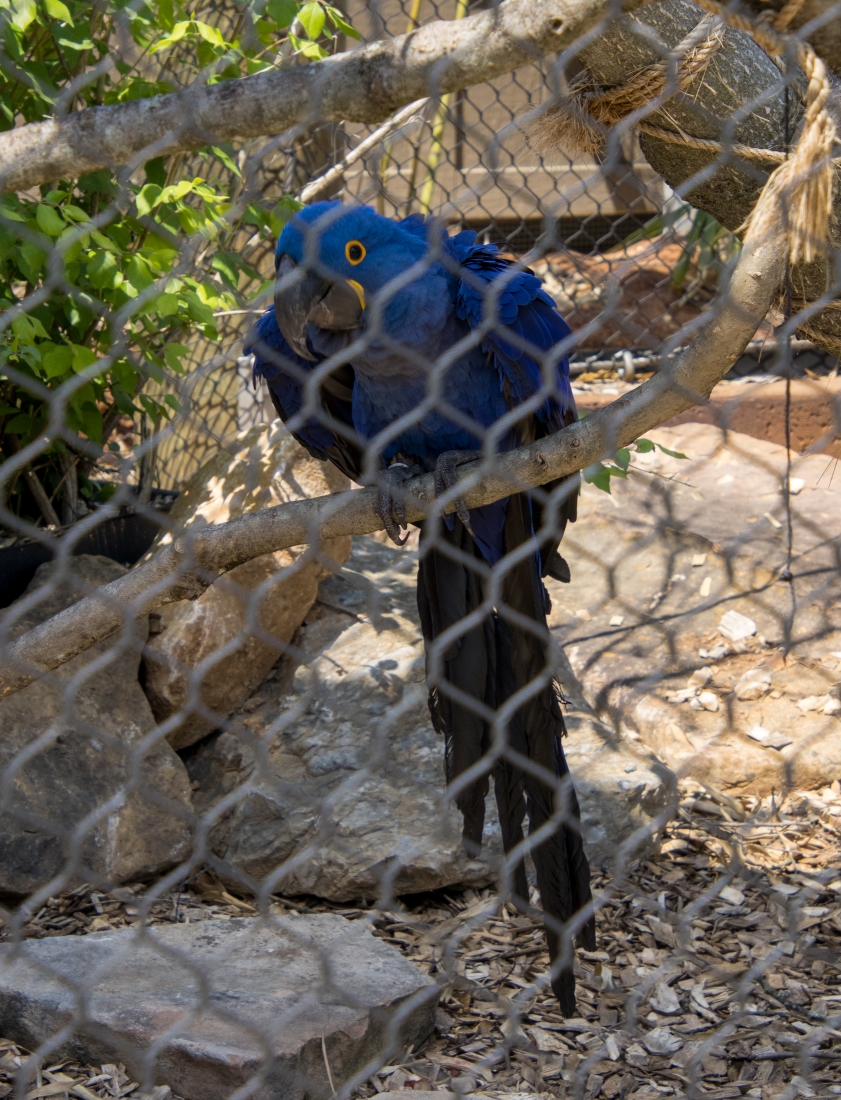
Parrots are notoriously difficult to breed in captivity, so a vast majority of these birds in the pet trade were taken from the wild. A study conducted by nonprofit organization, Defenders of Wildlife, found that in Mexico alone 65,000-78,500 parrots were trafficked each year, with roughly 75% of the birds dying in transit. Of the 22 species identified as being trafficked, six are endangered, 10 are threatened, and four are receiving special protection. The extinction of the Spix macaw has been determined by the International Union for Conservation of Nature to be due to the illegal pet trade.
On top of the noise, the work, and the obvious moral implications of macaw ownership, these birds require a large amount of room, must be taught how to fly if raised in captivity, and must also be written into an owner’s will, as they can live around 85 years. Birds of all varieties will also imprint on the animals around them, meaning they convince themselves that they are a member of the surrounding species. This makes it impossible for them to be reintroduced to their natural habitat. Spencer, for example, was raised as a pet in a household with lots of dogs and is therefore convinced that he is a dog, meaning that he could never return to the wild.
Zoo Knoxville is committed to aiding in species conservation. Right now, their conservation efforts for the macaws are focusing primarily on education. They aim to help people understand the risks that the macaws face and how guests can further help the many species of macaws that we share a planet with. The zoo also accepts money-box donations that go onto the World Parrot Trust.
